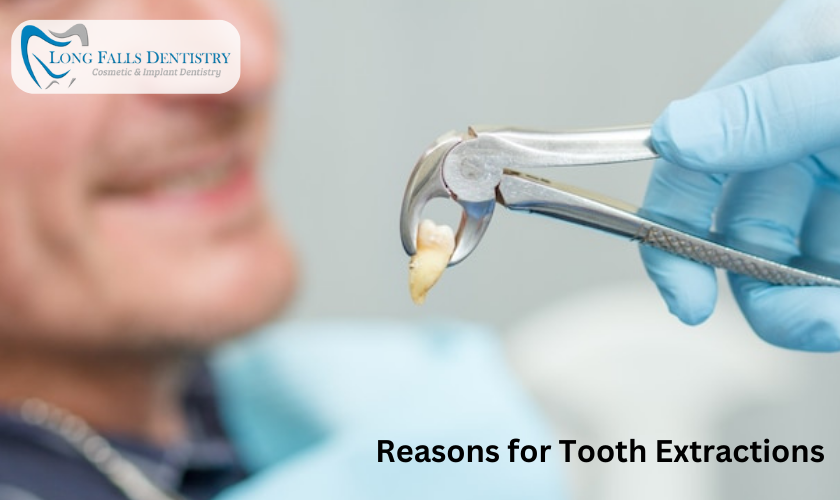When your dentist recommends a tooth extraction, you may feel apprehensive about going through with it but understanding why it might be necessary can help ease any worries or concerns you have surrounding the procedure. There are various reasons why your dentist might recommend a tooth extraction, and understanding what they are can help you make an informed decision about this treatment.
Tooth extractions are among the most common dental treatments administered in the United States. This procedure involves removing a tooth from its socket and can be performed for various reasons for tooth extractions, including damage, decay, misalignment and overcrowding. While it is considered invasive, tooth extractions remain essential to maintaining optimal oral health. This article will discuss when dentists recommend tooth extractions and provide insight into what to expect before, during and after treatment.
Reasons for Tooth Extractions
There are several reasons why your dentist may suggest the procedure when it comes to tooth extractions. Extraction may be necessary when teeth have been damaged by trauma or decay if the damage is beyond repair. Additionally, if overcrowding is an issue in the jaw or mouth, extracting one or more of the teeth can help create space for other teeth to move into their proper positions without resorting to braces or other orthodontic treatments.
Reason 1: Trauma and Decay
The damage may be beyond repair if a tooth is cracked or broken due to trauma, such as an accident or a fall. In this case, your dentist may suggest having the tooth extracted so that further damage can be prevented and infection is less likely. Additionally, if a tooth is decayed beyond repair and cannot be restored with fillings or other treatments, it must be extracted in order to prevent the spread of decay to other parts of the mouth.
Reason 2: Overcrowding
When teeth are overcrowded due to misalignment or lack of space in the jaw bone, extraction may be necessary in order to create enough room for teeth to move into their correct positions. This process allows orthodontic treatments such as braces and clear aligners to be more successful and can help prevent the need for surgery.
Reason 3: Impacted Teeth
Impacted teeth are those that have been blocked from fully growing due to a lack of space or misalignment. This is common among wisdom teeth and can cause infection, discomfort and damage to surrounding teeth. If extraction is necessary, your dentist may suggest having multiple impacted teeth removed at once in order to reduce the risk of further complications.
Tooth Extraction Treatments
When it comes to tooth extractions, there are two main treatments that your dentist might use depending on the reason for extraction: simple extraction and surgical extraction.
1: Simple Extractions
Simple extractions are used for teeth that have already broken through the gum line. During this procedure, your dentist will use a tool known as an elevator to loosen and remove the tooth. This is usually done under local anaesthesia so that you won’t feel any pain during the extraction process.
2: Surgical Extractions
Surgical extractions are typically used for teeth that haven’t yet broken through the gum line or impacted teeth, such as wisdom teeth. A small incision may need to be made in order to reach and remove the tooth, and general anaesthesia may be administered if necessary. Afterwards, stitches may be placed in order to close the wound and help with healing.
Tooth Extraction Aftercare
Once a tooth extraction is complete, it’s important to take care of the wound to minimize swelling, pain and discomfort. Your dentist may recommend taking an over-the-counter pain reliever such as ibuprofen or acetaminophen if necessary and avoiding strenuous activity for a few days after the procedure. Additionally, your dentist may suggest using an ice pack on the affected area for 15 minutes throughout the day to reduce swelling.
Conclusion
Tooth extractions are sometimes necessary when teeth are damaged beyond repair due to trauma or decay, overcrowding is an issue or impacted teeth must be removed. While it can be unnerving to undergo an extraction procedure, your dentist can walk you through the treatment process and provide aftercare instructions for tooth extraction to ensure a speedy recovery.
Frequently Asked Questions
Answer: The actual extraction process is not typically painful, as anaesthesia will be used during the procedure. However, after the extraction, some soreness and discomfort may be experienced while healing takes place.
Answer: Every person’s mouth heals differently but it usually takes about two weeks for a tooth extraction site to fully heal. Be sure to follow your dentist’s instructions carefully when caring for the wound to promote proper healing.
Answer: If proper aftercare is not taken, an infection can develop at the extraction site. Be sure to follow instructions from your dentist regarding post-extraction care in order to reduce the risk of infection.


